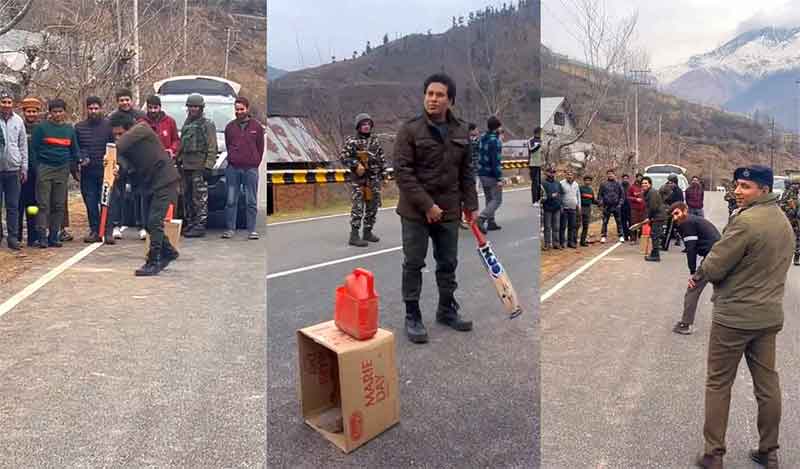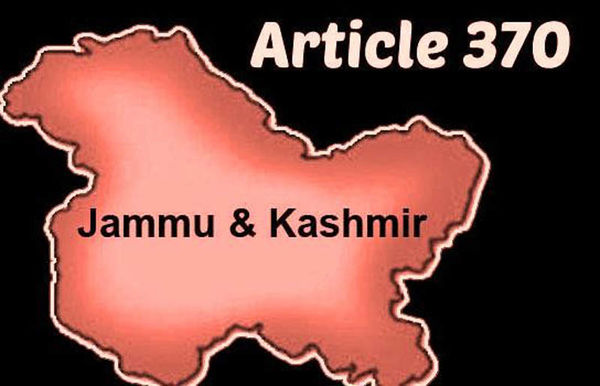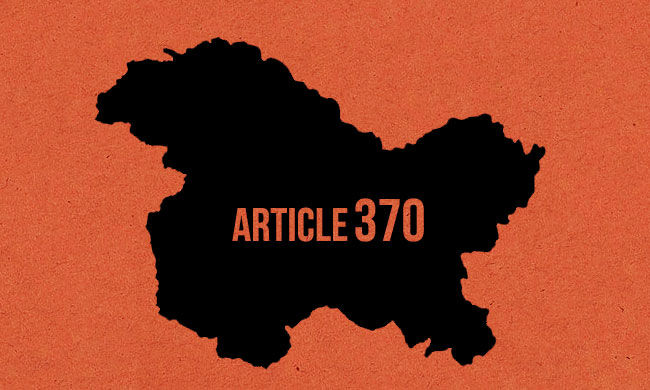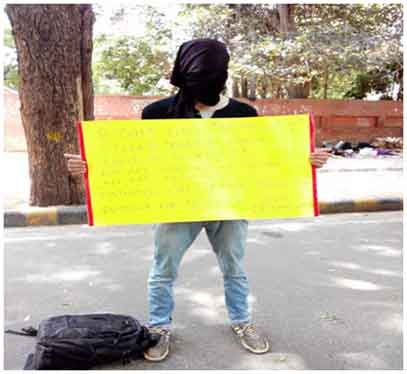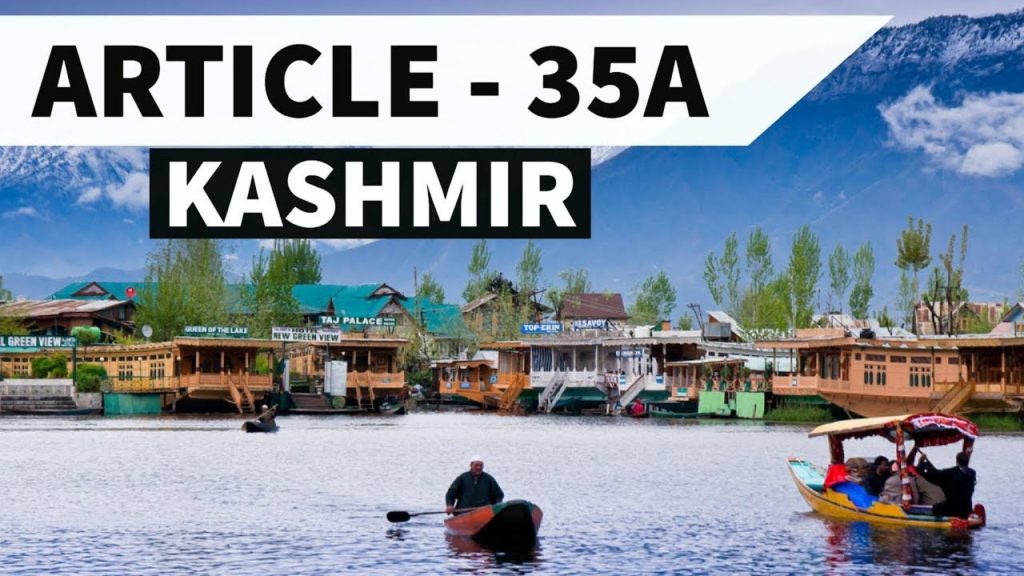
The State Subject Law of erstwhile State of JK had travelled a checkered path before it was adopted in the Constitution of India in the shape of Article 35-A in 1954. Before 1933, peasants of Kashmir had no ownership rights in the land. Muslims did not have proportionate education & employment rights even in the autocratic rule. Towards the end of the 19th century, the Punjabi Hindus had started getting jobs in the government departments of Dogra-Darbar and purchasing land from the locals of the State at an ever increasing scale.
Feeling alarmed and threatened by the foreign intrusion into their homeland and likely trampling over their employment and property rights, the Kashmiri Pandits staged protests against the Ruler. The protests which were initiated in 1889 were led & continued by more educated Kashmir Pandits under a movement further in 1910, 1922 & 1925 which came to be called ‘Kashmir for the Kashmiris’ , which was “anti-Panjabi- Hindu- agitation” & which stressed on making statutory measures for protecting job & property rights of the subjects. In 1889, under the viceroy’s pressure the Maharaja issued circular to all departments that Mulki (natives) should be given preference in government jobs in the State.
The Order was loosely drafted as anybody could claim Mulki & get a certificate from the concerned revenue officials. In 1912 an Order was passed by the Maharaja defining first time a State Subject was one who had obtained an Ijazat Nama, a certificate to the effect that the holder was entitled to all the rights of citizenship of the State, from the Darbar. This Order too did not stop the “outsiders” getting jobs & employment in the State administration.
Evidently it was inadequate as anyone could “secure the certificate for the mere asking”. The outsiders continued to be imported in even larger numbers by their kith and kin who held the Ministers’ jobs, besides almost all the posts of the Heads of Departments.
This trend continued despite the fact that the 1912-Order was passed to forbid employment of non-State Subjects in the public services besides disallowing them to purchase land in the State. So, evidently, it did not satisfy the aspirations of the agitating Kashmiri Pandits who had launched, to iterate, the agitation under the banner of “Kashmir for Kashmiris”, & who were also joined by Dogra Sabha by 1925. The cry of “down with the outsiders” was raised mostly by the Hindus. ( Prem Nath Bazaz) The Kashmiri Muslims, overwhelming majority of 97 % in Kashmir alone, & 85% of the total population of the State then, did not oppose the Hindu-Pandit-agitation. They extended support to the Pandit-movement, but wanted reservations in government jobs especially education as they were lagging far behind their Pandit counterparts in jobs & education. But, the Kashmiri Pandits always dubbed Muslim Kashmiris’ struggle & demand for their basic rights as “communal” & a threat to Pandit-dominance in Darbar & officialdom, though they constituted constitute just 3% of the population of Kashmir, or a “minuscule minority”, in a democratic sense.
For its deficiency, as noted above, the 1912-Order was replaced by the Notification 1-L/84 dated 20-04-1927 whereby the term “State Subject” was replaced by the term “Hereditary State Subject.” Under the Notification of 1927, the rights of employment in the public service & land were forbidden to non-State Subjects & under this Notification four categories of the Hereditary-State-Subjects of all regions of erstwhile princely State of JK were defined.
But this definition did not benefit all communities of the State as the top positions were “invariably filled by Jammu Dogras”, while the Kashmiri Pandits were “recruited as clerks in offices that were vacated by the Punjabis”. It “disappointed the Kashmiri Pandits”. (Ibid) But following in the footsteps of the Punjabi-Hindus and the Dogras, the Kashmiri Pandits, by hook or by crook, made it difficult for the Muslim young men to get even these subordinate jobs. (ibid) It is exactly here when the agitation for protection of rights of Muslims gathered huge strength after Muslim leaders of J&K under the “Guiding Light” of Dr. Sir Mohammad Iqbal & Kashmiri- Muslim-settlers of Punjab through All India Kashmir Committee vociferously demanded protection of the rights of the majority community. In the light of the Clancy Commission Recommendations following 1931-Muslim political awakening, the rights of overwhelming Muslim majority in government jobs & education were recognised; though again opposed by Kashmiri-Pandits who launched Roti Agitation against it as they felt a threat in those recommendations to their age old hegemony in Darbar & officialdom of the State. In the meanwhile, in 1932, the Notification of 1927 was followed by the Notification No. 13/L dated 27-06-1932 with a view to determine the status of the State Subjects in a foreign country & to inform the Governments of the foreign countries about the position of their (foreign) nationals in the State of J & K. So, to adumbrate the facts, the Notifications of 1927 & 1932 granted to the State Subjects exclusive rights of (1) scholarships, (2) land ownership and (3) recruitment to State Services. The Notifications of 1927 & 1932 were protected under the earlier J & K Constitution of 1939 which were further protected and preserved under the J & K Constitution of 1956 (Sections 5-A to 5-F).
So, the main objective behind the Order and Notification, mentioned above, was to address the concerns that were raised and brought to the notice of the then Sovereign Ruler by the residents of JK over a long of time. The concerns were addressed & translated by the Maharaja into certain special rights and privileges conferred vide said Order & Notification on the residents of JK with respect to their (1) immovable properties, (2) government jobs & (3) scholarships. Hence, these special rights & privileges are firmly grounded in the pre-Partition political history of JK.
Delhi Agreement & Constitutional Guarantee:
The rights & privileges secured under the Maharaja’s Orders/Notifications of 1927 & 1932 continued as such after India got freedom on 14-08-1947 & J&K “joined” India in October 1947 till 1954 when these rights & privileges were given protection under the Indian Constitution.
The Constitution of India came into effect from 26th January, 1950 & under Article 394 it was applied to the whole of India. It did not by its own force apply to J & K in the same way as it applied to the rest of India. It was extended to J & K State by virtue of two provisions only viz Article 370 and Article 1. And, Article 370 (1) (d) provided for the application of the provisions of the Constitution other than Articles 1 and 370 to the State with such exceptions and modifications as the President may by order specify. Article 370 incorporated three items of Instrument of Accession empowering Parliament to legislate on those items only as far as J & K State was concerned. Regarding [other] matters and provisions of the Constitution, under Article 370 (1) (d), it was laid down that only the President could extend them (other provisions of the Constitution and Parliamentary Laws on such matters in Union and Concurrent lists on which Parliament has power to make laws), with such exceptions and modifications as he may specify by order, to the State of J & K. However, this special process of applying Constitution to the State of JK was required under Article 370 to be completed only by an Order of the President in concurrence or consultation with the State Government.
India was tangled with UN regarding its “stand” on J&K. To confront those challenges at that time, the President in concurrence with the State government of Sheikh Abdullah passed the Constitution (Application to J & K) Order of 1950, which was concomitant with the Constitution itself & which gave a boost to the Constitutional relationship between the J&K & Union of India.
But, it was not found enough for this relationship to strengthen by relying on Article 370, Article 1 & Constitution (Application to J & K) Order, 1950 alone. More was deemed necessary to be done to strengthen the relationship. So, the discussions at Delhi for further strengthening bonds of relationship & bringing JK constitutionally closer to India, continued between Jawaharlal Nehru and Sheikh Abdullah, from 17-06-1952 to 17-07-1952, and the discussions ultimately culminated in what is commonly known as the Delhi Agreement of 24-07-1952 signed between Sheikh Abdullah and Jawaharlal Nehru. In other words, one can say that Delhi Agreement, despite reaction & criticism it bore from the Hindu hardliners of Jammu & some parts of India, provided the much needed support to India to assuage its immediate trouble at the international level by crawling along the constitutional path to reach “closer and closer” to JK State.
Point Three of the Delhi Agreement is pertinent in the context of the discussion and it is writ large from this point that till this Agreement, citizens of J & K were not regarded citizens of India and so, it was agreed that Article 5 of the Constitution of India would be extended to J & K to include the people who have a domicile in J &K to regard them as citizens of India. This point of the Delhi Agreement further empowered the State Legislature to make laws of its choice defining “State Subjects” and confer on them the privileges and rights which they enjoyed already under the cited Order & Notification of 1927 & 1932.
Now was the need to translate Delhi Agreement into action. So, in the backdrop of the Delhi Agreement followed by the recommendations dated 6th February 1954 of the J K Constituent Assembly‘s Advisory Committee on Fundamental Rights and Citizenship and Nehru’s Statement to the Lok Sabha about the Delhi Agreement ( excerpts below) , the President of India, in exercise of his powers conferred upon him by Article 370 (1) with concurrence of the Government of J & K headed by Bakshi GM, passed the Constitution (Application to Jammu & Kashmir) Order, 1954.
The Presidential Order of 1954, thus, implemented the Delhi Agreement whereby, among many other things, Indian citizenship was extended to the residents of JK and simultaneously Article 35-A was inserted into the Indian Constitution that gave carte blanche to the State Legislature to define who were the “State Subjects” & confer on the “State Subjects” special rights and privileges in public sector/government jobs, acquisition of immovable property in J&K, settlements, scholarships & other public aid and welfare schemes. In the backdrop of incorporation of Article 35-A in Indian Constitution, the JK Constituent Assembly, subsequently, made provisions relating to “permanent resident” by inserting sections 5-A to 5-F in the JK Constitution of 1956. From 1927 to 1954, the J&K State Subjects were governed by the above discussed Order & Notification of 1927 & 1932 in respect of their property, job & scholarship rights. And, from 1954 till August, 5, 2019, they were governed in relation to the said rights by Article 35-A of the Indian Constitution, sections 5-A to 5-F in the JK Constitution of 1956 & other property laws & rules of erstwhile J&K State.
Two important points:
(1) In his statement to the Lok Sabha on the Delhi Agreement, Nehru said: “…. our friends from Kashmir were very apprehensive about …. For a long time past, in the Maharaja’s time, there had been laws there preventing any outsider, that is, any person from outside Kashmir, from acquiring or holding land in Kashmir. …. the Maharaja stuck to this that nobody from outside should acquire land there. And that continues. So the present Government of Kashmir is very anxious to preserve that right because they are afraid, and I think rightly afraid, that Kashmir would be overrun by people whose sole qualification might be the possession of too much money and nothing else, who might buy up, and get the delectable places. …… So, we agreed and noted this down: ‘The State legislature shall have power to define and regulate the rights and privileges of the permanent residents of the State, more especially in regard to the acquisition of immovable property, appointments to services and like matters. Till then the existing State law should apply.” ( Ref Scroll.in 31-10-2015; GK 14-08-2015)
(2) The Delhi Agreement was a solemn pledge made by India State with the citizens of the J&K State at dawn of freedom and democratic system of India and any backtracking on it by Sheikh Abdullah was not to be allowed by Indian leaders , at any cost, as they thought that would mean “grave blow to” their “ national interest and naturally to their “international position” on Kashmir. (Ref Dr. Karan Singh’s letter dated 10-06-1953 to Nehru through Union Home Minister, Kailash Nath Katju, who was on an official tour of the valley, which contains the facts; letter is reproduced in Selected Correspondence of Dr Karan Singh) Indian leadership had bound itself to incorporate its terms in its Constitution, which it did by inserting Article 35-A and wanted J & K to do the same through its future Constituent Assembly which was also done, as noted above. ( Ref Two letters of Dr Karan Singh dated 3rd & 7th August, 1952, addressed to Jawaharlal Nehru, in reply to his letter 24-07-1952 amply show that he insisted on framing of the State Constitution first as was agreed in Delhi Agreement, Dr. Karan Singh, Select Correspondence between Jawaharlal Nehru & Karan Singh) The question arises if backtracking by JK leadership of the time, which was represented by Sheikh Abdullah, only popular leader in Indian leaders’ own words, from the terms of the Delhi Agreement, was unacceptable to Indian leaders, then, by the same logic, reneging by India after 73 years on it especially Point Three of the Delhi Agreement incorporated in Article 35-A should be equally unacceptable to the people of JK.
M J Aslam Author, academic & freelance columnist
SIGN UP FOR COUNTERCURRENTS DAILY NEWS LETTER

